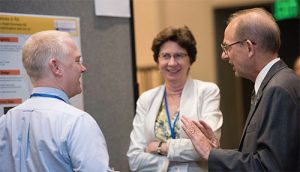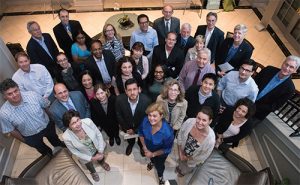
Jon Giles, MD; Joan Bathon, MD; and Foundation President Eric Matteson, MD, MPH, discuss Foundation-funded research at the poster reception of the Investigators’ Meeting.
The Rheumatology Research Foundation hosted the 9th annual Investigators’ Meeting in Atlanta on June 24–25. As a requirement for Foundation innovative research and pilot grant recipients, Foundation-funded investigators meet annually to provide updates and status reports on the work they are doing to advance treatments and cures for rheumatic diseases. More than 50 attendees enjoyed presentations from 20 award recipients. They also networked with one another to foster potential collaborations and build partnerships.
“This was a very successful meeting,” said Eric Matteson, MD, MPH, president of the Rheumatology Research Foundation. “I heard great discussions throughout the halls with attendees exchanging thoughts and ideas that will fuel future projects. That is exactly what this meeting is supposed to be about.”
Presentations demonstrated a variety of topics, all of which aimed to help improve treatments and care for people living with rheumatic diseases. Timothy Niewold, MD, from the Mayo Clinic, presented on his study, Type I Interferon as a Predictor of Anti-TNF Response. This research could determine if type I interferon (IFN) may be predictive of treatment response to TNF-α inhibitors in rheumatoid arthritis. “With this work, we might be able to spare people who would not respond to a drug, so that we can move them on to treatments that will work for them,” says Dr. Niewold.
A presentation from Iris Navarro-Millan, MD, MSPH, from the University of Alabama at Birmingham, described efforts to create an electronic tool to more efficiently record and access patient-reported outcomes. The rheumatic disease activity measurement tool, also known as READY, would allow patients to record their symptoms and learn about their medications. The information reported through the tool could be used by rheumatologists for treatment decisions, as well as by investigators to study data.

Attendees of the Rheumatology Research Foundation’s 2016 Investigators’ Meeting
Christopher Ritchlin, MD, MPH, from the University of Rochester Medical Center, presented on his study, Serum, Cellular and Imaging Markers of Arthritis in Psoriasis Patients. This work seeks to identify biomarkers that could determine which psoriasis patients are most at risk for developing psoriatic arthritis. The study will also determine if systemic treatment of psoriatic skin disease can suppress subclinical psoriatic arthritis.
Inez Rogatsky, PhD, from the Hospital for Special Surgery, says that the diversity of topics is one of her favorite aspects of the meeting. “I like that it brings together people from different backgrounds. I can get exposed to things that I would otherwise never hear,” she says. Lindsey Criswell, MD, MPH, from the University of California San Francisco, agrees: “It is exciting to hear from other investigators. The work is always cutting edge and valuable for our patients.”


